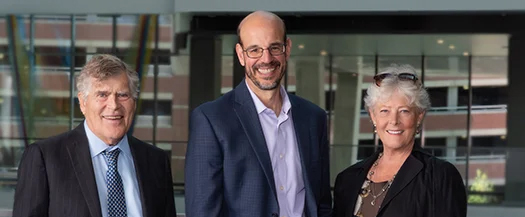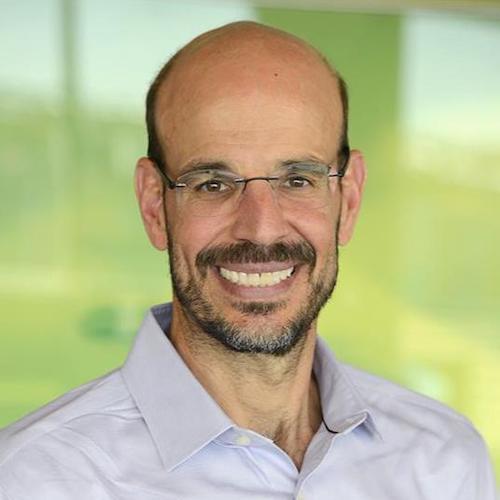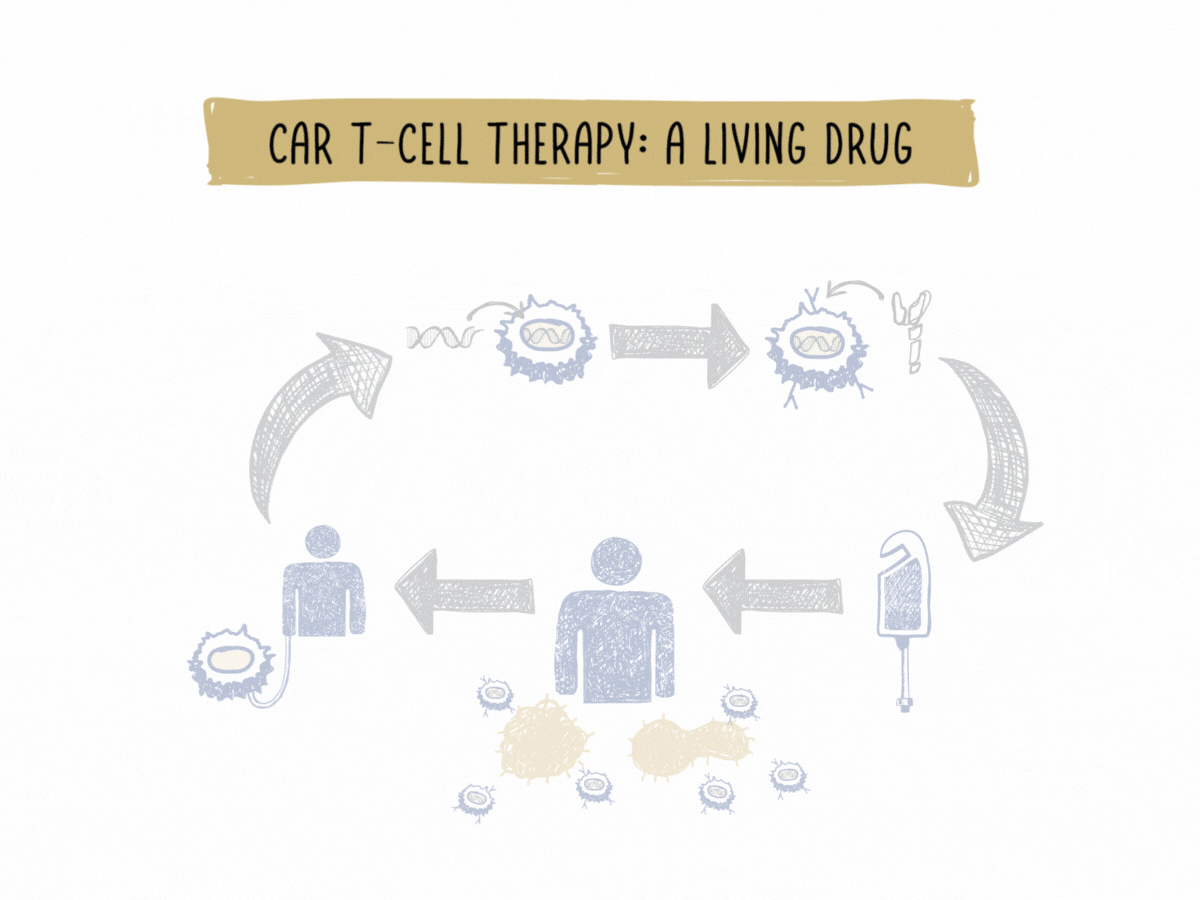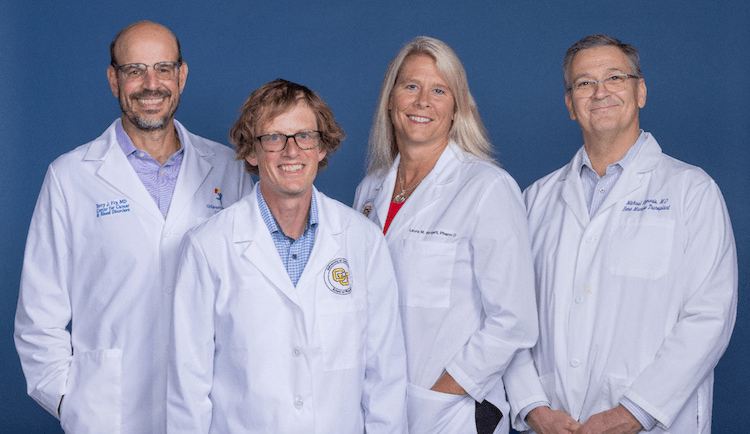Lightning in a Bottle:
Gates Institute Harnesses the Power of Cell and Gene Therapy
Through the newly established Gates Institute, dreams of next-generation therapies can become realities as we unlock the vast potential of regenerative medicine.
When describing regenerative medicine, some may think its premise sounds like a pitch for a new Star Trek episode. Coming soon to a TV near you: scientists using your own cells to cure you. As futuristic as it sounds, the application is very real. This new frontier of medicine goes beyond disease management to discover novel therapies that support our bodies in repairing, regenerating and restoring themselves.
“It’s the ultimate in personalized medicine,” said Terry Fry, MD, clinical professor and director of cancer immunotherapy at the CU School of Medicine on the University of Colorado Anschutz Medical Campus. “Regenerative medicine is all about radical innovation to address the unmet needs of patients. We’re developing new treatments with the potential to fully heal an underlying cause of disease.”
The thirst for scientific exploration and impact is quenched at CU Anschutz – a place where dreams are realized more rapidly because great science and standards of care exist in one place. Now the campus is poised to become the next major biotech hub with the creation of the Gates Institute, a revolutionary collaboration aimed at helping scientists develop cell and gene therapies more effectively, made possible by a historic $200 million philanthropic commitment from the Gates Frontiers Fund and investment by CU Anschutz.

The Gates Frontiers Fund, represented by trustee Diane Gates Wallach and her late brother, John Gates, helped create the original center and new institute. When asked, “Why now? Why expand the resources of the Gates Center for Regenerative Medicine to an institute?”, Wallach said she felt CU Anschutz was reaching a tipping point; it became clear that the vision needed to be bigger.
“If we’re serious about putting a stake in the ground for this campus to be a leader in regenerative medicine, if we’re going to move the needle of progress and continue to recruit top talent and be able to do more ourselves within the campus to bring those resources home, then creating an institute like this was a natural next step,” Wallach said.
As the inaugural Gates Institute Executive Director and Charles C. Gates Endowed Chair, Fry will lead the institute into a new phase of regenerative medicine, bridging the gap between the lab and patients.
This incredible investment will make it possible for our faculty to harness the vast potential of regenerative, cell, and gene therapies. We will develop a new generation of therapies from scientific discovery through proof-of-concept in humans that allow our clinicians to offer hope to those facing serious diseases.

Terry Fry, MD
executive director of the Gates Institute, clinical professor and director of cancer immunotherapy at the CU School of MedicineThinking outside the box
By establishing the Gates Institute, Wallach is honoring her family’s legacy to help Coloradans lead more productive lives – a noble vision that began with her late father, Charles C. Gates. Many know the age-old saying, “they broke the mold when they made you,” but few have earned the visionary status of Charlie Gates. A uniquely talented force of nature, Gates was a successful businessman and philanthropist who was ahead of his time when it came to seeing the potential of regenerative medicine. As he was nearing the end of his life, Charlie’s own personal ailments sparked an interest in stem cell research and how it might change the game for patient treatment.
“My dad was a pioneer through and through,” said Wallach. “His entire thought process was looking around the corner to see what will make an impact.”
Charlie wanted a better future for others facing medical issues like cancer or macular degeneration. He tasked his children, Diane and John, with continuing his quest of speeding scientific discovery. That's when they made initial philanthropic commitments from the Gates Frontiers Fund in 2006 to get the Gates Center up and running.
“There wasn’t a precedent when we started the Gates Center,” said Wallach. “It was a green field with boundless potential, so we weren’t confined to the traditional way of doing things.”
After the initial creation of a regenerative medicine program, the Gates Center, CU Anschutz began building out its bioscience ecosystem. Bringing together brilliant researchers and clinicians in stem cell biology and regenerative medicine, the campus became a magnet for extraordinary talent like Dennis Roop, PhD, the founding director of the Gates Center. A few years later, the Gates Biomanufacturing Facility was established, opening the door to manufacture therapies for first-in-human clinical trials.
“That was my dad’s intent, to do things differently,” said Wallach. “Approach things like a business, something entrepreneurial.”
Looking back on the progression of the Gates Center and Gates Biomanufacturing Facility, Wallach said she could not have predicted what the campus would become. What was once uncharted territory into regenerative medicine is now widely regarded as trusted science with enormous potential for patient impact.
'No one does their best work alone'
At CU Anschutz, collaboration is second nature thanks in large part to the campus’ constellation of assets. “Our campus certainly facilitates collaboration when you have two top-ranked hospitals, a research program and biomanufacturing all in one place,” said Fry. “It’s an unbelievable opportunity.”
The Gates Institute will touch nearly every key player at CU Anschutz including collaborations with researchers in the CU School of Medicine to impact patient care at UCHealth University of Colorado Hospital and Children’s Hospital Colorado, to partnerships with other institutions across the state. These types of collaborations will establish best practices in medicine and health that are defined at the Gates Institute and disseminated nationally.
“My dad had a wonderful saying: ‘No one does their best work alone’, and I couldn’t agree more,” said Wallach. “The future is about partnerships and that is one of the key things about the Gates Institute, to reach out well beyond CU and link arms with different partners.”
By connecting and centralizing existing campus resources, the Gates Institute will create a seamless translational pathway and move therapies through production in a matter of days.
“CU Anschutz is unique in that we have such a strong foundation both on this campus and throughout the state,” said Tom Gronow, president and CEO of UCHealth University of Colorado Hospital. “This creates a culture driven toward research and excellence and is one of the many reasons UCHealth is proud to aid in the collaborative effort.”
New treatment possibilities begin with highly targeted cell and gene therapies for cancer and other diseases. The goal? To reduce the time needed to translate a novel drug from the lab to the clinic. It’s less common for a university to develop, manufacture and test therapies in its own backyard, but this is where the Gates Institute shines.
“The leap from laboratory findings to clinical testing is a big one,” said Matthew Seefeldt, PhD, executive director for the Gates Biomanufacturing Facility. “When you look at the grand scheme of drug development, we’ve made enormous progress to create new categories of drugs and are now graduating to cellular and gene therapies. It’s a very exciting time in medicine.”
The end game
There have been a few magic moments within the field of regenerative medicine, beginning with the success of chimeric antigen receptor (CAR) T-cell therapies used to reprogram a patient’s T-cells to find and kill cancer cells. Fry’s research at the National Institutes of Health effectively changed the treatment of pediatric leukemia patients after leading the first-in-human clinical trials. At the time, this type of therapy was unheard of, making pediatric CAR T-cells the first FDA-approved gene therapy in 2017.
“The goal is to move away from traditional treatments for cancer like radiation and chemotherapy, whose high toxicities can lead to harmful side effects and negative patient outcomes,” said Fry. “Instead, we want to harness the power of the immune system to treat cancer in a way that is more selective by taking the patient’s own cells, modifying them and putting them back into the patient. It’s a living drug that targets cancer cells and kills them.”

The Gates Biomanufacturing Facility’s early success with CAR T-cell therapy changed the treatment landscape to offer better therapeutic options for pediatric and adult cancers. Now cell and gene therapies are gaining ground with the potential to heal patients living with diabetes, multiple sclerosis or heart failure.
“Part of Charlie Gates’ vision was to remove the friction from the scientific progress and move early-stage drugs into the clinic, and that’s essentially what we’re doing with the new institute,” said Seefeldt. “Cell therapy opens a whole new opportunity to not only innovate on the molecule side but also the manufacturing side.”
It’s evident that CU Anschutz doesn’t shy away from taking risks; when bold ideas and investments are made, they pay off in lives saved. And at the end of the day, putting patients first is all that matters, a belief Wallach shares deeply with the institution at large.
“That’s the end game,” she said. “This is all about improving lives for patients, and the Gates Institute is a core piece of how we can move innovation forward.”

To learn more about Fry's research and the life-changing treatments that are transforming healthcare, watch this video.
Want to share this article with a friend? Send them a link to Momentum via email.
